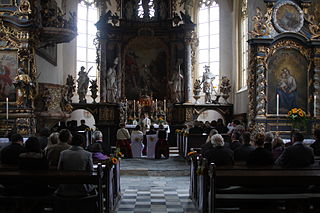
Inveni David, WAB 19, is a sacred motet composed by Anton Bruckner in 1868.

Am Grabe, WAB 2, is an elegy composed by Anton Bruckner in 1861, for men's voices a capella.

Trauungschor, WAB 49, is a wedding song composed by Anton Bruckner on 8 January 1865.

Laßt Jubeltöne laut erklingen, WAB 76, is a festive song composed by Anton Bruckner in 1854.

The Volkslied, WAB 94, is a patriotic song composed by Anton Bruckner in 1882 for a competition for a Hymne für das Deutsche Volk in Österreich.

Um Mitternacht, WAB 89, is a song composed by Anton Bruckner in 1864.

Um Mitternacht, WAB 90, is a song composed by Anton Bruckner in 1886 on a text of Robert Prutz. About twenty years earlier Bruckner had already composed a song on the same text.

Mitternacht (Midnight), WAB 80, is a song composed by Anton Bruckner in 1869.

"Ständchen" ("Serenade"), WAB 84.2, is a Lied composed by Anton Bruckner in c. 1846.

Der Abendhimmel, WAB 55, is a song composed by Anton Bruckner in 1862.

Sternschnuppen, WAB 73, is a song, which Anton Bruckner composed for his own men's voice quartet in c. 1848 during his stay in the Sankt Florian.

Sängerbund, WAB 82, is a patriotic song, which Anton Bruckner composed in 1882.

Du bist wie eine Blume, WAB 64, is a song, which Anton Bruckner composed in 1861.

"An dem Feste", WAB 59a, is a song composed by the 19-year-old Anton Bruckner in 1843 during his stay as schoolteacher's assistant in Kronstorf. In 1893, near the end of his life, Bruckner modified slightly its music score and let Karl Ptak put another text on the song, with as title "Tafellied", WAB 59c.

Das Lied vom deutschen Vaterland, WAB 78, is a patriotic song composed by Anton Bruckner in c. 1845 during his stay in St. Florian.

Der Lehrerstand, WAB 77, is a song composed by Anton Bruckner in c. 1847 during his stay in Sankt Florian.

Das edle Herz, WAB 66, is a song composed by Anton Bruckner in December 1857 during his stay in Linz. During his stay in St. Florian, Bruckner had already composed a first setting of the song for men's choir, WAB 65.

Vaterlandslied, WAB 92, is a patriotic song composed by Anton Bruckner during his stay in Linz.

Vaterländisch Weinlied, WAB 91, is a song composed by Anton Bruckner in 1866 during his stay in Linz.



















